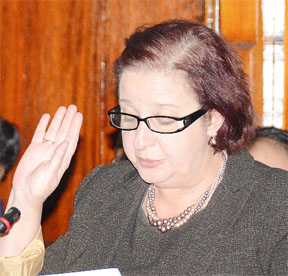With the budget debates and the examination of the estimates out of the way, government will be proceeding with its legislative agenda in the National Assembly, Presidential Advisor on Governance and PPP/C MP Gail Teixeira has said.
“There are many bills that we have but we will be bringing them to Parliament when we are ready,” Teixeira told Stabroek News on Thursday. She would not delve into details as to the nature of those bills. She said that some of the legislation requires consultations and these are ongoing, upon completion of which they will make their way into the National Assembly.
According to the PPP/C Manifesto for the 2011 elections, the ruling party promised that its new term would see legislation in the area of piracy and hijacking, to facilitate successful prosecutions; to protect society by enacting a bail act; and to stiffen custodial penalties for serious crimes.

The Manifesto also promised that the administration would operationalise the Access to Information legislation, continue to implement the Broadcast Act, in addition to enacting and implementing legislation to liberalise the telecommunications sector.
It also promised to complete the appointment and operationalising of the constitutional commissions, including by finalising the appointment of the Human Rights Commission and the Public Procurement Commission. And the PPP/C said it would reactivate the Office of the Ombudsman.

Like with the budget, the PPP/C will have to seek the support of the parliamentary opposition to pass bills in the National Assembly.
APNU and AFC, which have a one-seat majority, have also indicated that they would be tabling legislation.
Although the two parties have a one-seat majority to pass their own legislation, enactment of the laws would depend on whether President Donald Ramotar assents to them.
Speaking to the Stabroek News, Leader of the Opposi-tion and Leader of APNU David Granger said that the coalition is trying to recruit persons to draft legislation. He called it a highly technical and specialised exercise and recalled the statement made that the persons who draft bills for the government would be unable to do so for the opposition.
In January this year, Attorney General and Minister of Legal Affairs Anil Nandlall said it is not part of the mandate of the AG’s Chambers to draft bills for anyone other than the government.
“Our main concern in the first year of this Tenth Parliament is the proper management of public finances,” Granger said. “The budget failed to meet our expectations. It has failed to bring [government holding company] NICIL under the purview of the National Assembly,” he added.
With regard to the bills that APNU has in the pipeline, Granger said, “We have a concept but I cannot say now that we have a list of legislation. We are recruiting someone to assist us in drafting legislation.”
The AFC has on its parliamentary agenda for the period 2012 to 2014: amending the President’s Pension and Benefits Act; parliamentary reforms; equity in broadcasting on NCN; the Guyana Elections Commission (Gecom) reform; de-regularisation of telecommunication and broadcast sectors; restoration of Critchlow Labour College subventions; reduction of the Value-Added Tax; whistleblower legislation; decentralisation of Local Government organs and other reforms; youth empowerment; registration of hinterland residents; review of the Amerindian Act; addressing issues affecting mining communities and the environment; protection of the performing arts; establishment of a medical fund for MPs and improvement of status and general welfare of MPs.





